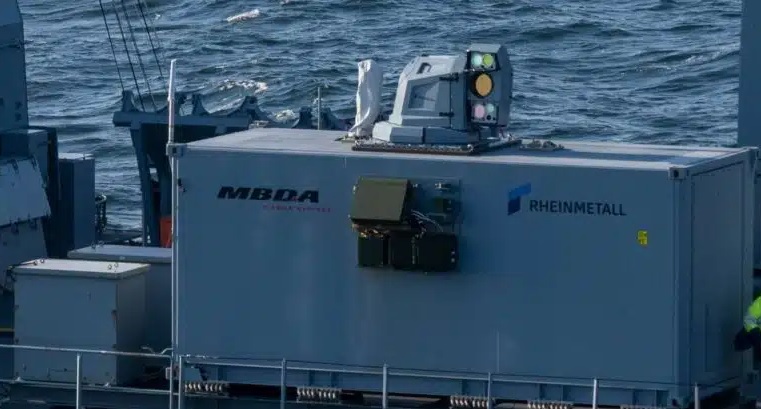Rheinmetall and MBDA Germany Partner to Develop Advanced Maritime Laser Weapons for Drone Defense

In a move signaling the future of naval defense, Rheinmetall and MBDA Germany have signed a cooperation agreement to develop a state-of-the-art laser weapon system designed for maritime applications. With both companies bringing their expertise in defense and laser technologies to the table, the collaboration aims to produce a functional laser weapon within the next five to six years, specifically focusing on countering emerging drone threats at sea.
A Joint Vision for Maritime Laser Defense
The defense sector has been increasingly looking to laser technology as a solution to modern combat challenges, especially as the use of drones in military operations continues to rise. Unmanned aerial systems (UAS), particularly in naval environments, pose unique threats due to their small size, maneuverability, and the difficulty of targeting them with traditional weapons. Rheinmetall and MBDA Germany recognize these challenges and believe that laser-based solutions offer an innovative and efficient way to neutralize such threats.
The partnership combines the complementary strengths of both companies. Rheinmetall is renowned for its work in high-energy laser systems, while MBDA Germany brings its expertise in missile systems and integrated defense solutions. Together, they plan to create a powerful and effective maritime laser weapon capable of protecting ships from drone attacks. This collaboration reflects a broader trend in military technology, where defense contractors are increasingly turning to directed-energy weapons to address modern threats.
Successful Testing on the German Frigate Sachsen
This partnership builds upon earlier successful trials of a laser weapon demonstrator, which was tested aboard the German Navy’s frigate Sachsen (F124) from June 2022 to September 2023. During this extensive trial period, the laser weapon system underwent over 100 test shots, showcasing its ability to detect, track, and engage targets in real-world conditions. The test results were impressive, demonstrating that laser technology is not only feasible but highly effective in maritime settings.
The successful deployment of the laser weapon on the Sachsen frigate underscores the growing interest in integrating such systems into naval platforms. Lasers provide a fast, precise, and cost-effective way to counter multiple threats, including drones, missiles, and potentially even swarm attacks. Unlike traditional munitions, laser systems don’t require ammunition resupply and have minimal collateral damage, making them a practical solution for prolonged engagements.
Why Laser Weapons Are the Future of Naval Defense
Laser weapon systems offer several advantages over conventional weapons. First and foremost, they are capable of engaging targets at the speed of light, which is crucial when dealing with fast-moving drones or missiles. Secondly, they provide a virtually unlimited number of shots as long as the platform has sufficient energy, significantly reducing the logistical burden of carrying and resupplying ammunition.
Additionally, laser systems are highly scalable, meaning they can be adjusted to deliver varying levels of power depending on the target. This makes them versatile tools capable of handling a wide range of threats, from disabling small drones to destroying larger aerial or surface threats. For maritime environments, where threats can emerge quickly and unpredictably, this flexibility is invaluable.
The integration of laser weapons on ships like the Sachsen represents a shift toward more advanced, energy-efficient defense technologies that align with the modern demands of naval warfare. With drones becoming more prevalent in both commercial and military spheres, the ability to quickly and efficiently neutralize them is critical. Rheinmetall and MBDA Germany’s joint laser weapon system aims to provide this capability, ensuring that naval vessels are prepared for future threats.
The Road Ahead: Market Entry in 5–6 Years
While the current laser demonstrator has proven its capabilities, Rheinmetall and MBDA Germany are now focused on bringing a fully operational system to the market. According to the companies, they plan to introduce their laser weapon system within the next five to six years, with the initial focus on maritime applications. The timeline reflects the necessary research and development required to refine the system, integrate it fully into naval platforms, and ensure it meets military standards.
Both companies are optimistic about the potential of their laser weapon system to revolutionize naval defense. As technology continues to evolve, laser weapons are expected to play an increasingly important role in protecting ships from airborne and surface threats, especially in scenarios where traditional weapons may struggle to keep up with modern advancements in drone technology.
In conclusion, Rheinmetall and MBDA Germany’s partnership represents a significant step forward in the development of laser weapons for maritime defense. By combining their respective expertise, the two companies are positioning themselves at the forefront of directed-energy weapon technology. Their joint effort is not only focused on countering drones but also on creating a versatile, scalable system that will enhance the defensive capabilities of naval forces for years to come. As these technologies mature, we can expect to see laser weapons becoming a key component of future naval arsenals.


